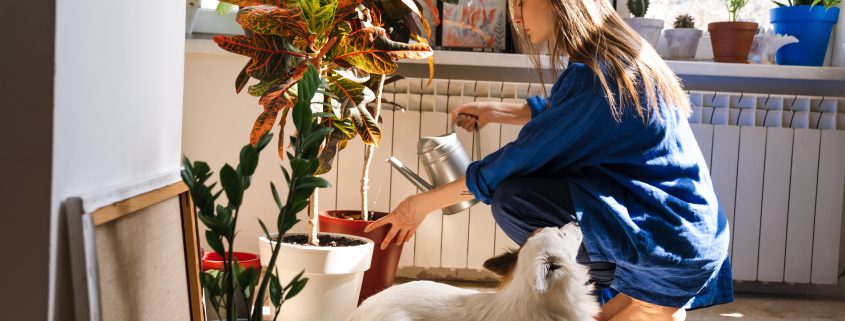With spring just around the corner we are eager to get back outside, and so are our family pets, but with that comes an increased risk of ingesting toxic plants. Whether they’re potted plants, a beautiful bush or tree, or a flowering garden bed, some plants could pose a threat to your pets. In this blog, we cover the most common plants and flowers that are toxic to your furry friends and what symptoms you should look out for.
Lilies
In a bouquet or as a stand-alone feature in a garden, lilies are always striking. But, as stunning as they are, they unfortunately need to be kept far away from pets. All lilies tend to have adverse effects on pets, especially cats. All parts of the plant, including the pollen, are toxic.
Depending on the type of lily ingested, the effects may differ. However, all lilies irritate the mouth and digestive tract of cats, and even dogs. They could also cause nausea and vomiting.
Daffodils
Daffodils are another stunning plant common in homes and gardens. These flowers contain lycorine – an alkaloid – as well as other toxins such as glycosides. These toxins are present in all parts of the plant and are concentrated in the bulb. This could spell bad news for dogs who love to dig up garden beds.
Daffodil poisoning in pets causes severe diarrhea, tremors, drooling and vomiting. In rare cases your pet could also experience seizures. In milder cases, dogs and cats may experience ‘daffodil itch’, a reaction caused by coming into contact with the plant’s sap.
Tulips & Hyacinth
Lactones in tulips and similar alkaloids in hyacinths, can cause profuse drooling, vomiting and diarrhea — leading to dehydration and additional problems. All parts of the plant are toxic, but the lactones and alkaloids are concentrated in the bulbs of these plants. Ingestion of the bulbs can lead to more severe signs, including increased heart rate and changes in respiration.
Marigolds
Marigolds are a favorite plant for many gardeners. The bright yellows and oranges attract bees and other beneficial insects to your garden. But they can negatively affect your pets if eaten.
If cats nibble on these plants they could get an upset stomach and an irritated mouth. They’ll also experience drooling and diarrhea. Marigold sap will also irritate your cat’s skin. Dogs are safer around marigolds, but the sap can still irritate their skin and cause a rash.
Chrysanthemums & Daisies
These plants contain lactones and pyrethrins as well as other irritants in their leaves and stems. Ingestion of these plants can commonly cause upset stomachs and diarrhea – in more serious cases they can even affect the nervous system. Signs of toxicity include vomiting, diarrhea, increased salivation and loss of coordination.
Cycad Palms
Multiple different types of palms fall under the category of cycad, and all parts of these plants are poisonous.The plants contain chemical compounds which are toxic to the nervous system when ingested. Symptoms include vomiting, lethargy, jaundice, hemorrhagic gastritis, blood clots, liver failure, and paralysis. Ingesting as small as 1-2 seeds can be fatal.
Poinsettia
While poinsettia flowers are not as toxic as other plants, poinsettias can still cause mild irritations and discomfort to your pets. Cats and dogs may experience vomiting and excessive drooling after ingesting the plant’s sap or leaves. Additionally, if this sap comes in contact with the skin, it could become inflamed and itchy.
Some claim that the extent of toxicity of poinsettias is over-exaggerated, and luckily the effects on some pets are only mild. But it’s still a good idea to keep your pets away from this decorative festive plant – just in case.
Your Pets are our Priority!
At the National Animal Supplement Council (NASC), our number one priority is to promote the health and wellbeing of your pets. That is why we created the NASC Audit Program and the Quality Seal, which helps you identify animal health and nutritional supplements that come from responsible suppliers committed to producing the highest quality, most consistent products available. Visit our website to learn more and to see a list of NASC members that have earned the Quality Seal.


